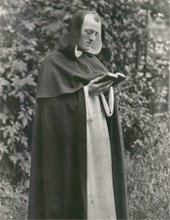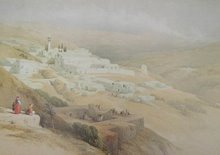Even amongst his fellow Dominicans, as yet untainted by modernism and its laxities, Father McNabb was considered to be an ascetic. As Prior of Woodchester, Hawkesyard and Holy Cross he had developed a reputation for being hard on others, but certainly no harder than he was on himself: and he could always lend someone a sympathetic ear, something he never seems to have had for himself! He ate sparingly - he blamed his “Protestant stomach” - and his face and body demonstrated the hard self-denial of his religious life. He slept on the floor of his cell - which floor he scrubbed daily - and his bed lay unused even through illness and his final death-pangs. He had no chair in his room until the last days of his life when - still refusing to lie on his bed - he finally consented to be seated in a chair. When writing, he knelt at a table surmounted by a crucifix and small statue of the Blessed Virgin: on the table lay his only books, a copy of the Vulgate, his Breviary, and the Summa Theologica. He kept a compendious box of notes, all written on scraps of paper - the backs of cards, used envelopes and the like - on a huge variety of subjects some penned in English, some in Latin, some in Greek and some even in Hebrew (this box is now with the Dominican archive in Edinburgh and is looked after by the oldest Dominican in Great Britain, Father Bede Bailey, a pupil of Father McNabb’s). Everything he wrote was hand-written: he abominated most machinery and had particular a vehemence for type-writers! Hilaire Belloc, who shared many views with Father McNabb, always had a fascination for machinery and considered the type-writer - and the telephone (something else Father McNabb loathed) - as a great boon (Belloc’s handwriting was notoriously slovenly: Father McNabb’s was habitually neat and legible). It would no doubt have been both interesting and amusing to have been a fly-on-the-wall as they discussed the desirability of the ‘automated writing machine’!
Of course, as a religious, indeed, as a Catholic, prayer was central to his life. His profound attachment to Holy Mass and the Office aside, Father McNabb devoted much of his energy to praying and to encouraging others to pray the Holy Rosary. As a man of formidable intellect and deep learning he had nothing but impatience for those who claimed that the Rosary was a prayer, a devotion, for simple beginners, for the unlettered, for those who have not yet ascended to the sublime heights of spirituality. Such people rendered Father McNabb almost speechless with indignation. “The Rosary”, he would say, “is the safest and surest way to union with God through mental prayer”. What impressed him the most about the Holy Rosary was the prayerfulness of many of the faithful who had been taught or had grown up to pray to God through Our Blessed Lady. Again and again he would say: “Most of the contemplatives I have met are in the world, and these have found union with God through the Rosary.” Devotion to the Rosary, he insisted, should be fundamental to a Catholic’s prayer life. As he said during a sermon on Rosary Sunday on 1936:
“The Incarnation is the centre of all our spiritual life.. One of the means by which it is made so is the Holy Rosary. There is hardly any way of arriving at some realisation of this great mystery equal to that of saying the Rosary. Nothing will impress it so much on your mind as going apart to dwell in thought, a little space each day, on Bethlehem, on Golgotha, on the Mount of the Ascension.”
Father McNabb wore a homespun habit - he only had the one at any one time - and marched around London in the same heavy hob-nailed boots from year to year. Over his shoulders as he trudged about the streets he had slung his “McNabb-sack”, a capacious if battered means of carriage for his Vulgate, Breviary, and whatever other books he needed. Although he was not averse to rail travel, or public transport in general, he usually refused to travel by car or by cab: the long distances he had to cover in London from St Dominic’s Priory to the various convents to which he was chaplain, to Speakers’ Corner and to Parliament Hill, he managed on foot and at a startling pace. Hilaire Belloc, who astonishingly still holds the time record for walking between London and Oxford, was full of admiration for Father McNabb’s speed and endurance: indeed, he gave him advice on how to follow his own route from Toul to Rome, famously walked and recounted in The Path to Rome. Father McNabb’s superior would not however allow him the vacation time to accomplish this walk, which he had so wanted to do - at the age of 68 (Belloc had been 31!) - to celebrate the golden jubilee of his profession in the Dominican Order.
There is a moving account of an occasion when Father McNabb actually took a cab back to his Priory. For months he had made sick calls to a young girl - an only child - who was dying. The mother - who had asked him to come - was a Catholic; the largely absent father was not, and moreover was one of his chief hecklers at Parliament Hill. They were a poor family, lodged with another family in a single, small room in a crumbling tenement block near St. Pancras Station. Sadly, the daughter died: McNabb said the Requiem Mass. Just a few weeks later the mother died - she had been ill throughout her daughter’s illness but had said nothing about it to anyone. McNabb again said the Requiem Mass. As he left the graveyard the husband approached him, gave him a flower from a funeral bouquet that Father McNabb had arranged from a pious benefactor, and asked him how he was planning to return to his Priory. The sky was thunderous and rain was beginning to fall. Father McNabb replied that he planned to return as he had come - on foot. The husband - trebly poor now - pulled from his pocket enough money to pay for a cab: at first Father McNabb demurred and then he realised that this was the widower’s mite. With tears in his eyes he accepted the money. He never forgot this instance of simple charity. As he wrote:
“Blessed are the poor! Few things have ever touched me more than that. Out of his poverty he offered me my fare. Imagine that coming from one who has not the faith. What am I to do when I see him next? To kiss his feet would be unworthy of him. I shall pray... that God may give him the consolation of the faith.”
The full extent of Father McNabb’s own charity will of course never be known. What he did privately remained private even after the public death that we will shortly be considering. One known instance may have to suffice. In another rotting block of flats close to Camden Lock lived an old bed-ridden woman. For months, possibly for years, someone came regularly to talk to her, to tidy the room and to scrub the floor. A few weeks after Father McNabb had died, a group of people living in rooms near to the woman’s were discussing who would do the job as the old lady who had come to do the work before had evidently stopped coming. Only the bed-ridden lady’s best friend knew that this ‘lady’ had in fact been Father McNabb, on his way to Parliament Hill, dropping in for an half-hour-or-so to see the old lady.
I touched earlier upon Father McNabb’s homespun habit. When one was worn out he received another - and the donor from 1917 onwards was the Ditchling Community, an artistic variant of the back-to-the-land movement which Father McNabb supported throughout his life. Eric Gill and Hilary Pepler had been the two talents behind its genesis in 1907. Father McNabb acted as the Community’s chaplain - many of the its members became Third Order Dominicans - but nonetheless fault-lines soon apeared. Its attempts to live off the land faltered - most of its members were artists and had little aptitude for real land-work - and gradually it became an artistic rural retreat rather than a self-sufficient community with an artistic bent. Father McNabb was disappointed that the members of the Community had not applied themselves more to the primary thing - to working on the land. On this matter he did not see eye-to-eye with Eric Gill. Eventually, Gill departed for Wales in 1924. Thereafter, despite his enthusiastic advice to all who asked for it to return to the land, to strive for poverty and self-sufficiency away from the stink of the cities, Father McNabb never again attached himself to any particular project as he had to Ditchling.
Indeed, Father McNabb was always concerned with the primary things and saw any work or activity that moved even one stage away from the primary thing as less worthy and possibly less virtuous. As a result he loathed international finance which was as far removed from reality and the primary things as it was possible to go. As he put it, cuttingly:
“Some men wrest a living from nature. This is called work. Some men wrest a living from those who wrest a living from nature. This is called trade. Some men wrest a living from those who wrest a living from those who wrest a living from nature. This is called finance.”
Before I move on to describe Father McNabb’s death, I feel I must offer up a few examples of his wit in order to derail any growing impression that Father McNabb must have been a miserable fanatic. Father McNabb certainly had a way with words. He was particularly adept at dealing with hecklers. On one occasion during a long disquisition on sin at Speakers’ Corner an Irish woman shouted out: “If I was your wife I would put poison in your tea!”. Grinning, Father McNabb replied: “Madam, if I were your husband I would drink it!”. On another occasion he famously compared hearing nuns’ confessions to being pecked slowly to death by ducks. On a more serious note, he once attended a public meeting on the subject of the Mental Degeneracy Bill then passing through the House of Commons. After listening to various medical experts explaining how they would certify as degenerates, and as a result sterilise, many types with whom Father McNabb was familiar in his pastoral work, the good friar stood up and, having been called to speak by the chairman of the meeting, bellowed: “I am a moral expert and I certify you as moral degenerates!” He stormed out of the meeting to rapturous applause and the meeting broke up in disarray.


No comments:
Post a Comment